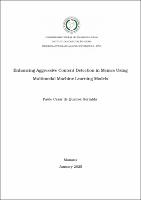| ???jsp.display-item.social.title??? |


|
Please use this identifier to cite or link to this item:
https://tede.ufam.edu.br/handle/tede/10697Full metadata record
| DC Field | Value | Language |
|---|---|---|
| dc.creator | Queiroz Hermida, Paulo Cezar de | - |
| dc.creator.Lattes | http://lattes.cnpq.br/3158714298481379 | eng |
| dc.contributor.advisor1 | Santos, Eulanda Miranda dos | - |
| dc.contributor.advisor1Lattes | http://lattes.cnpq.br/3054990742969890 | eng |
| dc.date.issued | 2025-01-31 | - |
| dc.identifier.citation | QUEIROZ HERMIDA, Paulo Cezar de. Enhancing harmful content detection in memes using multimodal machine learning models. 2025. 128 f. Thesis (Doctorate in Informatics) - Federal University of Amazonas, Manaus (AM), 2025. | eng |
| dc.identifier.uri | https://tede.ufam.edu.br/handle/tede/10697 | - |
| dc.description.resumo | This thesis focuses on detecting harmful content in memes using advanced machine learning methods. It begins with a literature review, identifying the strengths, weaknesses, and challenges of current approaches while introducing a new taxonomy to facilitate method comparison. The research presents an improvement to canonical multimodal transformer models by integrating Compact Parameter Blocks into the encoder segments, achieving superior performance compared to more complex techniques. Additionally, it explores the use of generative models, such as Multimodal Large Language Models (MLLMs), to detect aggressive memes through specific prompts. The results indicate that while these models can identify harmful content, their performance declines when high-level multimodal reasoning is required. This research contributes to the field by enhancing detection methods and exploring new generative model-based approaches, aiming to create safer online environments while preserving freedom of expression. | eng |
| dc.description.abstract | Memes are a popular way of sharing messages with large audiences. They are often funny or informative, but memes can also spread hate speech and harm- ful content. This represents a challenge for social networks, which need to detect and moderate this type of content to provide a safer online environment. This thesis focuses on improving the detection of harmful content in memes using ad- vanced machine learning methods, including canonical transformer-based models and recent multimodal large language models (MLLMs). First, the work presents a literature review that highlights the strengths, weaknesses, and challenges of current methods. It also introduces a new taxonomy in order to categorize current methods, making it easier for researchers to compare and improve detection tech- niques. Then, this work introduces a novel approach to enhance the performance of canonical multimodal transformer models. This is done by adding a specific module called Compact Parameter Blocks into the encoder segments of these mod- els. The experimental results demonstrate that the proposed method outperforms several more complex approaches. The thesis also explores the use of generative models, such as MLLMs, to detect aggressive memes by using specific prompts to guide the models. The results show that these models can identify aggressive memes, despite not being explicitly designed for this task. However, the perfor- mance of MLLMs decreases significantly when the level of multimodality reasoning required is very high. This research contributes to the field by providing practi- cal improvements to current detection methods and by exploring new approaches using generative models. These advances are important in creating safer online environments while respecting freedom of expression. | eng |
| dc.format | application/pdf | * |
| dc.thumbnail.url | https://tede.ufam.edu.br/retrieve/81845/TESE_PauloQueirozHermida_PPGI.pdf.jpg | * |
| dc.language | eng | eng |
| dc.publisher | Universidade Federal do Amazonas | eng |
| dc.publisher.department | Instituto de Computação | eng |
| dc.publisher.country | Brasil | eng |
| dc.publisher.initials | UFAM | eng |
| dc.publisher.program | Programa de Pós-graduação em Informática | eng |
| dc.rights | Acesso Aberto | - |
| dc.rights.uri | https://creativecommons.org/licenses/by-nc-nd/4.0/ | pt_BR |
| dc.subject.cnpq | CNPQ::CIENCIAS EXATAS E DA TERRA::CIENCIA DA COMPUTACAO | eng |
| dc.title | Enhancing harmful content detection in memes using multimodal machine learning models | eng |
| dc.type | Tese | eng |
| dc.creator.orcid | https://orcid.org/0000-0001-6875-8465 | eng |
| dc.subject.user | Harmful memes | eng |
| dc.subject.user | Multimodal models | eng |
| dc.subject.user | Harmful content detection | eng |
| Appears in Collections: | Doutorado em Informática | |
Files in This Item:
| File | Description | Size | Format | |
|---|---|---|---|---|
| TESE_PauloQueirozHermida_PPGI.pdf | 6.46 MB | Adobe PDF |  Download/Open Preview |
Items in DSpace are protected by copyright, with all rights reserved, unless otherwise indicated.




